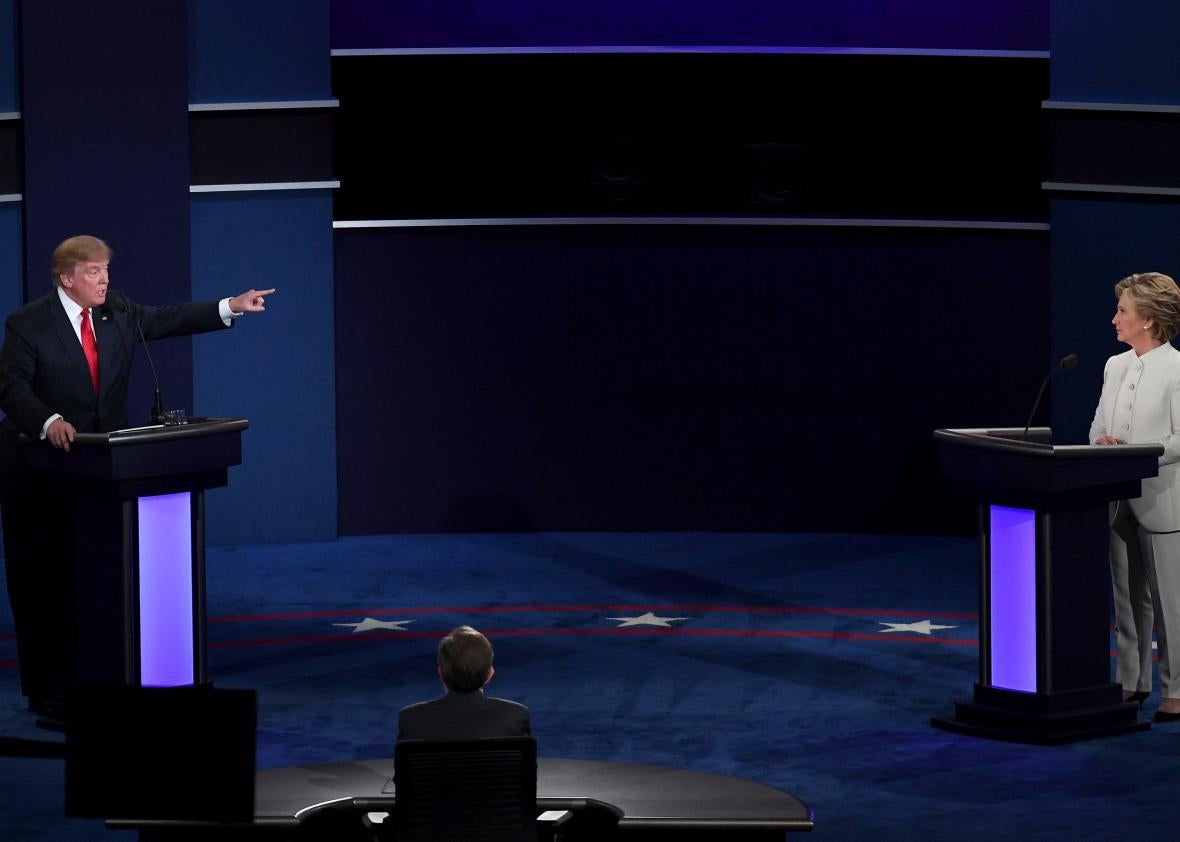Compared with allegedly obstructing justice, allegedly profiting off the presidency in violation of the Constitution’s Emoluments Clause, allegedly laundering money on behalf of Azerbaijani oligarchs and the Iran Revolutionary Guard in violation of the Foreign Corrupt Practices Act, allegedly sexually assaulting women, and maybe even working with a foreign dictator to sway the U.S. presidential election—Donald Trump’s crimes against the English language seem relatively minor.
On Sunday morning, however, the president tweeted the following:
I see what he did there. He took the word collude—a word that journalists and voters use daily to describe alleged collaboration between Trump’s campaign surrogates and the Russian government—and slapped it onto Hillary Clinton, who for some reason Trump still considers his political rival. No colluder, no colluder! She’s the colluder!
It’s worth noting some of the ways in which this tweet is interesting:
1. The tweet is nonsensical. Trump wants people to believe that he’s under scrutiny for committing a crime that he did not commit and, moreover, that Hillary committed the same crime and got away with it. Trump is implying that he didn’t secretly and illegally collaborate with Russia, but Hillary secretly collaborated with the Democratic National Committee, and unlike him, she was not investigated by Congress and the FBI for it! But while the conversations among DNC staffers that WikiLeaks published did show that the DNC tried to hurt Bernie Sanders’ candidacy—the “Unfair to Bernie!” tag on Trump’s tweet is its most reasonable clause—those emails did not show Hillary colluding with the DNC to commit a crime, which is what the allegations of collusion against Trumpworld are about. Webster’s defines collusion as “a secret agreement for fraudulent or illegal purpose.” When Trump says “collude,” he seems to mean merely “works with.”
2. The tweet is ironic. We only know about the DNC’s moves to help Clinton win because hackers with ties to the Russians acquired and leaked the DNC emails showing as much. According to the U.S. intelligence community, they did this to help Trump win the election. So Trump here is pointing to Hillary–DNC “collusion” that potentially came to light due to possible collusion between his own campaign and Russia, if such collusion occurred. Life, indeed, is a rich tome.
3. The tweet is strategic. It’s fascinating to watch Trump try to turn around the words that have caused him so much trouble. We’ve seen this schoolyard-bickering tactic—I’m not colluding, you are—before, most saliently, in Trumpworld’s wielding of fake news. The question now is: Will this strategy work?
Originally, the public conversation about fake news hurt Trump. Its existence and reach were tied to fictional stories that made him look good and made Clinton look bad—“Pope Francis Endorses Trump,” “Hillary Arms ISIS!!!,” and what not. The popularity and spread of these stories suggested that Trump supporters were, at least in part, duped, and that if “fake” news was made-up garbage, “real” news from trustworthy outlets actually existed and was valuable. Trump didn’t like that. After all, the “real” news was accurately covering his scandals and incoherent statements. So he transmogrified fake news, using it to discredit stories that he didn’t like. And it worked. Surrogates like Sean Spicer and Kellyanne Conway starting using the phrase, too, beating back reporters’ questions simply by stating “fake news.” Fake news became their own.
Now, two other words are harming the Trump administration every time they’re uttered: obstruction and collusion. Since Rod Rosenstein appointed Robert Mueller as special counsel to lead the Russia investigation, and particularly since fired FBI Director James Comey testified before the Senate on June 8, there’s been a lot of heat on Trump. There’s significant evidence that Trump at least attempted to obstruct justice—in his effort to lean on Comey to “let go” of the FBI’s investigation of former National Security Adviser Michael Flynn and in his firing of Comey, which by Trump’s own admission, he did at least in part because of the Russia investigation—and so the gang has gone back to the well. Behold some tweets that Trump has burped out since Comey’s testimony:
Monday morning, as the cock crowed, our boy was back at it:
What the White House does not seem to understand or appreciate is that obstruction and collusion pose dangers to the presidency far more serious than fake news ever did. Trump’s battle for the meaning of fake news was primarily one over perception and public opinion. If enough people believed fake news meant what the administration wanted it to mean, the administration had won. Fake news, both in its original meaning and in Trump’s usage, might corrode democracy like so much vodka—but it isn’t a crime.
In contrast, obstruction of justice and collusion with a foreign power to sway an American election are very much crimes. Public perception of what those words mean won’t save Trump from Robert Mueller’s investigation. “Obstruction” and “collusion” accusations against Hillary or other Democrats may soon be common yawps from Fox News and the internet’s MAGA corners, but social media won’t save Trump from the law, either.
Nevertheless, public opinion about just who is “obstructing” and “colluding” could help the administration in one realm: Congress. Republican majorities control the body that ultimately will need to prosecute the president if Mueller finds there is something to prosecute. Perhaps if enough Republican constituents side with the president on what obstruction and collusion really mean and who engages in it, senators and representatives will feel the old pressure of base revolt and primary challenges—and agree with the president that the real crime here is Hillary’s “collusion” with the DNC.
